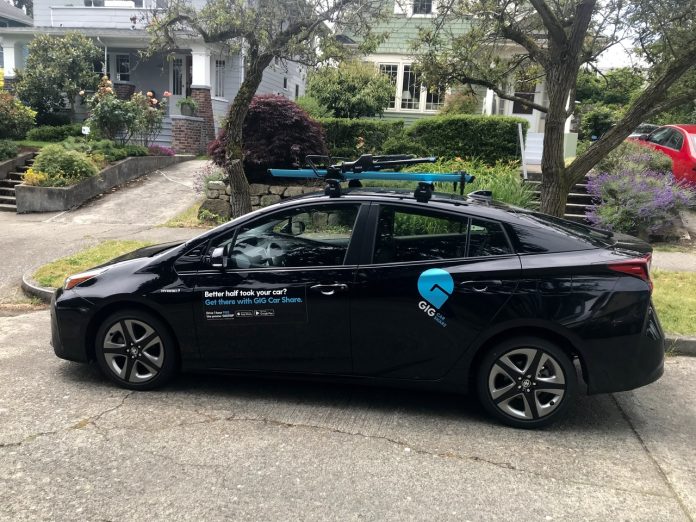GIG Car Share has finally launched in Seattle with service starting on June 30th. The service includes an initial 250 cars and limited homearea centered on Central and North Seattle. GIG, a subsidiary of AAA of Northern California, announced in February that the company would start up a free-floating carshare service in May, but that was before the pandemic hit Seattle in earnest in March, slowing rollout of the program. Seattle is the third market for GIG, following Sacramento and the San Francsico Bay Area.
GIG planned to enter the Seattle market to replace the long-time carshare provider Car2Go that left at the end of February. The carshare market has been shrinking for the past year as other free-floating carshare services LimePod and ReachNow closed up operations. The main competitor to GIG is Zipcar, which requires monthly membership dues and uses a traditional model and only allows users to pick-up and drop-off cars at specific parking spots.
The membership model is currently free with no monthly or initial registration costs. The rate structure is not too dissimilar to Car2Go’s with $0.40 charges per minute that caps at $15 per hour. These charges cover all costs, including insurance and gas. On top of this, GIG is setting other price caps at $55 for eight hours and $85 per day of use. Access fees per use, slated to be be $1, and the $5 airport parking fee are also waived for the time being. GIG has not said how long the introductory pricing structure will remain in place.
The carshare fleet will entirely consist of Toyota Priuses that include bike racks, providing dual city and recreational use. The carrying capacity of the vehicles is five people, including the driver. GIG is using hybrid electric variants in the Seattle market, but other markets have all-electric models. With 250 vehicles, GIG touts that there is “roughly 18 cars per square mile on average within the [homearea], nearly double the density of past providers.”
Within the homearea, users are allowed to park vehicles anywhere on-street where legally permitted. This includes paid on-street parking spaces, time-limited on-street parking spaces, and within restricted parking zones without extra charges. Users should be aware that this does not apply to on-street parking spaces for deliveries, short-term unload, handicap, on-street parking spaces that turn into auxiliary lanes, and other special on-street parking designations. Outside of the homearea, users will still be charged for use of a vehicle even if stopping it for a period time. Users will need to return to the homearea to fully end a trip.

The initial homearea where carshare users can expect pickup and dropoff GIG cars is somewhat limited, though it does cover approximately 13 square miles. GIG has chosen a homearea that include major districts like Downtown Seattle, Uptown, Capitol Hill/First Hill, South Lake Union, and the University District. It also touches Eastlake, Queen Anne, Montlake, Wallingford, and Laurelhurst. However, there are many streets dotted throughout the homearea that will be restricted for on-street parking, preventing users from ending trips there.
GIG has one extension of the homearea outside Seattle. As other past services, there will be a location near Seattle-Tacoma International Airport where users can pickup and dropoff cars. The Wallypark location just south of the airport on Pacific Hwy S north of the the S 188th St intersection will be the designated pickup and dropoff location.
The initial homearea was “based on market research, demand, population density and accessibility to transit and retail,” according to GIG. It is not clear if a race and social equity analysis was used in determining the bounds of the homearea, but based upon the areas being served, it likely was not a strong factor if one was.
Under the terms of the free-floating carshare permit conditions, GIG will need to expand the homearea to include the entire city within two years of starting operations and has no limit on the number of cars. At the peak of Car2Go, the company operated 750 vehicles on city streets and covered the entire city in two years, which coincided with fleet expansion to the maximum allowed at that time.
GIG expects to grow the fleet and homearea as demand increases with homearea expansions more likely to happen sooner. Feedback from members could be influential in some of those decisions as well as conversations with city officials.
Local surveys and data have shown that free-floating carshare programs, like GIG, help reduce car dependence and promote transportation alternatives to car ownership. Seattle has led the nation in decreasing car ownership rates over the past decade with a 3% drop. Paired with improved transit, bikeability and walkability, carsharing options have helped ease people into skipping car ownership, making the services an instrumental piece of the mobility pie.
Stephen is a professional urban planner in Puget Sound with a passion for sustainable, livable, and diverse cities. He is especially interested in how policies, regulations, and programs can promote positive outcomes for communities. With stints in great cities like Bellingham and Cork, Stephen currently lives in Seattle. He primarily covers land use and transportation issues and has been with The Urbanist since 2014.



